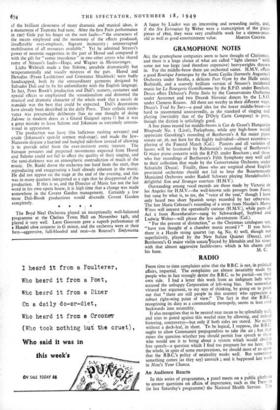GRAMOPHONE NOTES
Au. the gramophone companies seem to have thought of Christmas, and there is a large choice of what are called " light classics " with some not too large (and therefore expensive) heavyweights thrown in. For the middle-brow there are orchestral suites. H.M.V. offers a good Boutique Fantasque by the Santa Cecilia (formerly Augusteo) Orchestra under Serafin, a delicate Peer Gynt by the Halle under . Barbirolli, and a coarsely brilliant version of Strauss's incidental music for Le Bourgeois Gentilhomme by the R.P.O. under Beecham. Decca offers Debussy's Petite Suite by the Conservatoire Orchestra under Ansermet and two Dvorak Slavonic dances by the L.S.O. under Clemens Krauss. All these are worthy in their different ways. Decca's Trial by Jury—a good idea for the lower middle-brow—is hard to recommend unreservedly, as the standard of singing and playing (inevitably that of the D'Oyly Carte Company) is poor, though the diction is unfailingly good.
A fine piano record for middle-brows is Cor de Groot's Hungarian Rhapsody No. t (Liszt), Parlophone, while any high-brow would appreciate Gieseking's recording of Beethoven's A flat major piano sonata op. 26, not least for the highly individual—almost eccentric— playing of the Funeral March (Col.). Pianists and all varieties of brows will be fascinated by Rubinstein's recording of Beethoven's G major piano concerto with the R.P.O. under Beecham ; and those who buy recordings of Beethoven's Fifth Symphony may well add to their collection that made by the Conservatoire Orchestra under Schuricht (Decca). Finally, those who are sceptical about English provincial orchestras should not fail to hear the Bournemouth Municipal Orchestra under Rudolf Schwarz playing Mendelssohn's delightful Son and Stranger overture (H.M.V.).
Outstanding among vocal records are those made by Victoria de Lai Angeles for H.M.V.—the well-known solo passages from Faust, but sung by what is, to me, the " voice of the year," though I have only heard two short Spanish songs recorded by her otherwise. The late Maria Cebotari's recording of a scene from Nicolai's Merry Wives will interest the operatically curious (H.M.V.), while parts of Ad 2 from Rosenkavalier—sung by Schwarzkopf, Seyfried and Ludwig Weber—will please the less adventurous (Col.).
" For the present of distinction," as the Christmas cataloguessay, " have you thought of a chamber music record ? " If you have, there is a Haydn string quartet (op. 64, No. 6) well, though not superlatively, played by the New Italian Quartet (Decca), and Beethoven's G major violin sonatalalaycd by Menuhin and his sister with that almost aggressive faultlessness which is his charm and
his bane. M. C.














































































 Previous page
Previous page